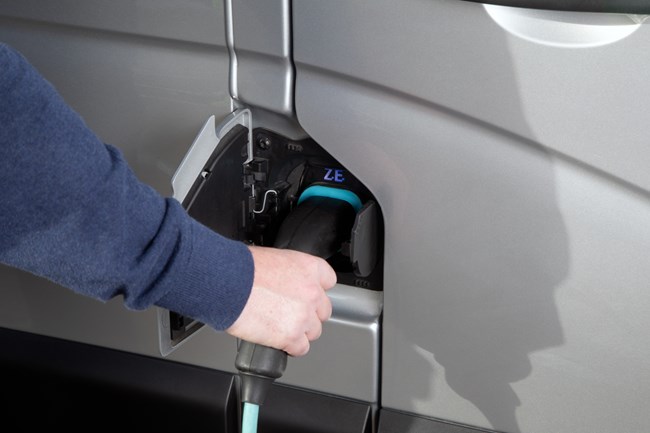- 'Luxury' tax on expensive pick-up trucks suggested
- ADVERTISEMENT FEATURE: Essential advice to avoid the van fleet ICE-berg
- ETRUX launches new Ford E-Transit Trizone
- Renault gives UK debut to Master E-Tech at CV Show
- Isuzu D-Max long-term test – Latest Report
- Isuzu D-Max V-Cross Steel Edition revealed
- IVOTY Report: Stellantis explores the hydrogen proposition
- New Maxus EVs include eDeliver 5 van
- Used LCV values reach six-month high
- ADVERTISEMENT FEATURE: IVECO Daily Mission Awards 2024 Q2 Round-up: Grounds Maintenance & Forestry
Annual zero-emission van sales targets proposed
Date: Friday, April 8, 2022 | Author: Sean Keywood

Plans for mandatory minimum levels of zero-emission van sales each year between 2024 and 2035 have been put forward by the UK Government.
The Department for Transport is carrying out a consultation on its Zero-Emission Vehicle Mandate policy.
As previously announced, the government plans to outlaw new pure petrol and diesel car and van sales by 2030, with some hybrid sales continuing until 2035.
Under the newly-published proposal, a certain proportion of zero-emission new vehicle sales for manufacturers to meet would be legally mandated from two years’ time, and this would increase annually.
In its consultation document, the Department for Transport states these should be at least as ambitious as targets set out in its Transport Decarbonisation Plan and Net Zero Strategy.
Acknowledging that the pace of electrification in the new LCV market is behind that for cars, it has proposed less stringent targets for the van sector.
These would start with 8% of a manufacturers’ van sales being required to be zero-emission in 2024, with this target then increasing in each year subsequently, including reaching 52% in 2030.
The Department for Transport says yearly targets would provide certainty to the sector, including vehicle manufacturers, energy providers, and charge point operators. However, it says the right would be reserved to change the targets based on market conditions, providing that reasonable notice was given and industry consultation carried out.
Reacting to the proposals, BVRLA chief executive Gerry Keaney said he was pleased the specific needs of the van sector had been recognised.
He said: “We welcome the acknowledgment that vans require a different trajectory to cars, which has been a cornerstone of the BVRLA’s engagement on this issue.”
Reacting to the proposals as a whole, he added: “The ZEV sales mandate is a vital part of the UK being able to reach its Net Zero targets. Its effective implementation will be the difference between the UK leading the way for decarbonisation or falling behind the rest of Europe.
“The consultative approach taken by the Department for Transport has been commendable and the BVRLA is pleased to see many of the association’s key considerations included within the plans.
“In the face of the worst supply crisis the industry has seen for generations, trajectories need careful consideration and must be kept under review as the supply chain stabilises.”
Society of Motor Manufacturers and Traders (SMMT) chief executive Mike Hawes said: “The automotive sector continues to invest billions in a wide and growing range of zero emission vehicles, vehicles which are already becoming commonplace on Britain’s roads. To accelerate the pace of take up and deliver the carbon savings Net Zero demands, however, regulation must encourage consumers to purchase, not just compel manufacturers to produce.
“Any mandate must be pragmatic, flexible and reflective of every manufacturer’s long-term commitment. It must also avoid being so complex and prescriptive that it becomes a straitjacket for the market and UK manufacturing investment.
“Market transformation is proven to work fastest when mandates are matched with incentives and, for automotive electrification, we also need commensurate and binding targets for infrastructure provision.”
View The WhatVan Digital Edition


